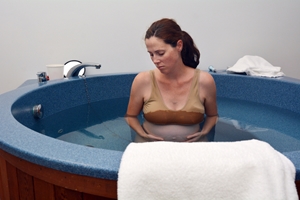
When I first heard of women giving birth in bathtubs, I couldn’t help but laugh. It sounded so new age and hippie – the sort of birth people who believed in healing crystals and morning meditation would go for. But then I hit 32 weeks of pregnancy, and the thought of an unmedicated childbirth (like I had planned) scared me enough to try any measure promising calm and comfort. So, I signed up for my hospital’s birthing tub.
What is it?
Water birth refers to a birth where a woman spends any part of labor or delivery submerged in water. Many hospitals – especially those with a midwife group – may provide women access to a birthing pool or bathtub for labor, but require her to exit once pushing begins.
Benefits
Lowering yourself into a warm pool of water can be incredibly soothing during labor. For women who choose to skip or delay an epidural, a bathtub can be a good pain management tool. Some evidence suggests that laboring in water can also help prevent tearing of the perineum, the delicate tissue between the vagina and rectum.
Risks
As lovely and gentle as they sound. water births also come with their own unique set of risks.
- Hepatitis C: All women planning on a water birth should be routinely tested for Hepatitis C, an infection that can be transferred from mom to baby through water. This is done by a simple blood test during pregnancy to determine your eligibility for this type of birth.
- Infection: Due to bacteria living in plumbing systems and thriving in warm environments, it’s possible – though rare – for you or your baby to get seriously ill following a water birth. To help narrow the risk for post-birth infection, hospitals may require you to leave the tub before pushing.
- Monitoring: While a hospital may have equipment specifically to monitor baby’s heart rate while mom’s submerged in water, it may not be as effective at picking up a heartbeat. Your doctor or midwife may require you to exit the tub to keep a better handle on baby’s well-being throughout labor.
- Emergency: Many doctors cite the lack of information around water birthing as a prime reason for avoiding it during the last phase of labor. Once your cervix is fully dilated and you’re ready to begin pushing, your health care team may ask you to relocate to the bed. In the case of an emergency Cesarean section, every minute counts to get you to the operating room.
If you’re looking for natural pain management tools, water birthing may be the right option for you. Talk to your doctor or midwife about their hospital’s policies and sanitization guidelines before writing this step into your birthing plan.


Leave a Reply